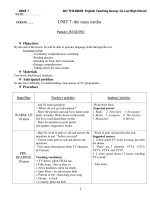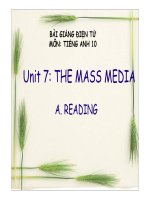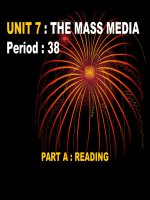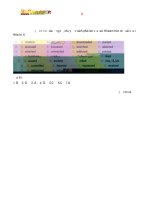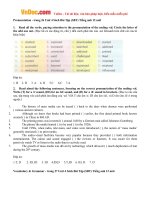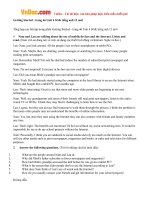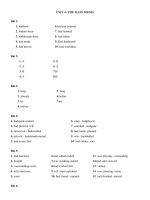Unit 4. The mass media. Lesson 3. Reading
Bạn đang xem bản rút gọn của tài liệu. Xem và tải ngay bản đầy đủ của tài liệu tại đây (1.57 MB, 22 trang )
Thursday, July 5th , 2018
WELCOME TO MY TEACHING DEMO
English 12 – Unit 4: THE MASS MEDIA
Lesson 3: Reading
MASS MEDIA FORMS
Presented by Nguyễn Trần Trúc Thanh
I. WARM-UP
THE MASS MEDIA
Thursday, July 5th , 2018
UNIT 4: THE MASS MEDIA
LESSON 3: READING
(Page 50 - 51)
MASS MEDIA FORMS
OBJECTIVES:
- Skimming and scanning a passage for general ideas and
specific information
- Learning additional vocabulary and information related
to the history and forms of Mass media.
MASS MEDIA FORMS
New vocabulary:
1. News programmes
2. Data sharing
3. Leaflets
4. Reality shows
5. Instant messaging
chương trình tin tức / thời sự
chia sẻ dữ liệu
tờ rơi
chương trình thực tế
tin nhắn tức thời/ nhanh
II. PRE-READING
1. Work in pairs. Put the words/phrases related to the mass media
in three groups.
- News programmes
-
Reality shows
Instant messaging
Leaflets
Data sharing
Websites
Dramas
Newspapers
Books
Social networking
- Magazines
d
e
m
s
s
a
m
e
h
T
ia
Television
The Internet
Books
Magazines
Leaflets
Newspapers
News programmes
dia
The mass me
Television
Dramas
Reality shows
Documentaries
The Internet
Websites
Social networking
Instant messaging
Data sharing
I. WHILE – READING
2. Quickly read the text and choose the best heading.
a. The history of print media
b. Forms of mass media
c. The advent of the Digital Media Age
d. Means of mobile communication
3. Match each of the words with its meaning
a. audience (n)
/ˈɔːdiəns/
1. appear; begin to be known or noticed
b. broadcast (v)
/ˈbrɔːdkæst/
2. the ordinary people in society who are not
leaders or who are considered to be not very
well educated
c. advert (n)
/ˈædvɜːrt/
3. the people who watch or listen to a particular
programme (a play, concert, talk, ect.)
d. the masses (n)
/mæsiz /
e. emerge (v)
/iˈmɜːrdʒ/
5. the time when something first begins to be
widely used
f. advent (n)
/ˈædvent/
6. a notice, picture or film telling people about
a product, job or service
4. send out programmes on TV or radio
1
2
3
4
5
6
7
8
a. audience (n)
/ˈɔːdiəns/
3. the people who watch or listen to
a particular programme (a play,
concert, talk, ect.)
b. broadcast (v)
/ˈbrɔːdkæst/
4. send out programmes on TV or radio
c. advert (n)
/ˈædvɜːrt/
6. a notice, picture or film telling people
about a product, job or service
d. the masses (n)
/mæsiz /
2. the ordinary people in society who are
not leaders or who are considered to be
not very well educated
e. emerge (v)
/iˈmɜːrdʒ/
1. appear; begin to be known or noticed
f. advent (n)
/ˈædvent/
5. the time when something first begins
to be widely used
WORDS
a. audience (n)
khán giả
b. broadcast (v)
phát thanh, truyền hình
c. advert (n)
tờ / mục quảng cáo
MEANING
3. the people who watch or listen to a particular
programme (a play, concert, talk, ect.)
4. send out programmes on TV or radio
6. a notice, picture or film telling people about
a product, job or service
d. the masses (n)
2. the ordinary people in society who are not
quần chúng nhân dân
leaders or who are considered to be not very
well educated
e. emerge (v)
nhô lên / nổi lên
f. advent (n)
sự xuất hiện
1. appear; begin to be known or noticed
5. the time when something first begins to be
widely used
III. WHILE -READING
4. Read the text again. Decide if the following statements are true
(T), false (F), or not given (NG). Tick the correct box.
T
1. Mobile phones and the Internet are the only forms
of mass media.
2. The role of mas media is to entertain, amuse, inform,
educate and unite people.
3. The mobile phone is regarded as a unique means of
communication.
5. Only digital media have influenced people’s lives and
society.
NG
4. People nowadays prefer instant messaging and social
networking to email.
F
IV. POST-READING
5. Work in pairs. Talk about the forms of mass media that you
use every day. Explain how you benefit from using them.
Forms of mass media
The internet
Radio
Cinema
Recordings
Television
Which / prefer?
Why / use it?
When / use it?
What / use it for?
How often?
How / to get benefits?
V. CONSOLIDATION
You now can understand the different forms of mass
media and their roles.
You’ve enlarge your vocabulary related to the topic and
improve your reading skills of skimming for general
ideas and scanning for specific information.
HOMEWORK
1. Learn by heart all the expressions in the lesson.
2. Write a short paragraph of the mass media that you
use every day.
3. Prepare for the next lesson
SPEAKING : advantages and disadvantages of using
social networking.
